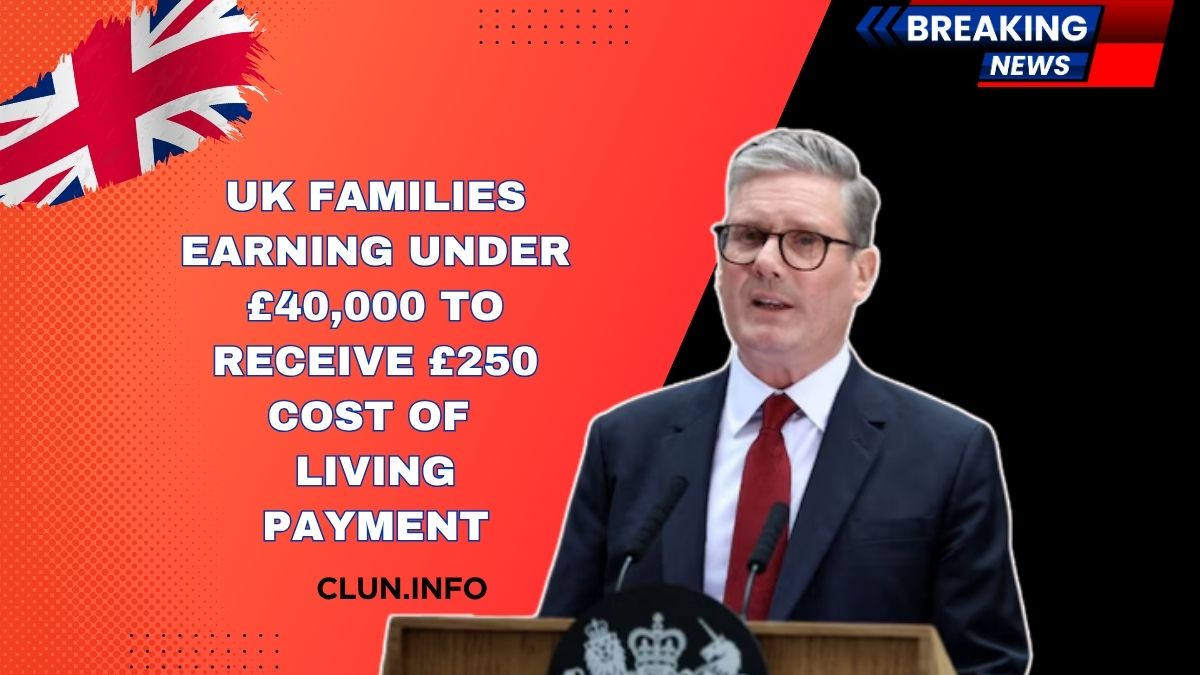A much-needed £250 cost of living payment is coming for UK households earning under £40,000 annually, offering financial relief amid soaring food, energy, and housing costs.
The payment is part of the seventh phase of the Household Support Fund, extended until 31 March 2026.
Funded by the Department for Work and Pensions (DWP) but distributed by local councils, this support is designed to help families with daily essentials and prevent financial hardship during ongoing economic challenges.
What Is the £250 Cost of Living Boost?
The £250 cost of living boost is a one-off payment or direct support aimed at households who are most at risk of financial instability. This payment is not universal—it is means-tested, and eligibility is decided locally by each council based on central funding.
It covers a wide range of needs such as:
- Food and energy bills
- Water charges
- Housing costs
- Phone and broadband bills
- Clothing or transport
- White goods (e.g., fridge, freezer, washing machine)
Note: In cases involving white goods, these items will be provided directly rather than in cash.
Eligibility Criteria for the £250 Payment
To qualify, families must meet specific income and savings criteria, and provide detailed documentation. Here’s a summary:
| Eligibility Criteria | Details |
|---|---|
| Household income | Less than £40,000 net per year |
| Savings threshold | Less than £1,000 in savings |
| Residency | Must reside in a participating council area |
| Hardship requirement | Must demonstrate financial hardship |
| Required documentation | Proof of income, bank statements, utility bills |
The Enfield Council outlines that eligible applicants must explain their hardship and provide evidence, including recent bank statements, income proofs, and a utility bill if applying for help with energy or water.
Other councils across the UK are also offering similar support but with varying rules and limits.
Who Else Can Get the £250 Support?
Aside from income thresholds, the government is also providing the £250 payment to people receiving certain benefits between 15 January and 28 February 2025, including:
- Universal Credit
- Income-based Jobseeker’s Allowance
- Income-related ESA
- Income Support
- Working Tax Credit
- Child Tax Credit
- Pension Credit
- Personal Independence Payment (PIP)
- Disability Living Allowance (DLA)
- Attendance Allowance
This is the first time that recipients of PIP, DLA, and Attendance Allowance have been included, recognizing the higher living costs faced by people with disabilities or long-term illnesses.
Payment Schedule and Method
- Main payment window: 17 July 2025 – 30 July 2025
- Payment method: Direct bank transfer (no cheques or vouchers)
- Delays: Possible minor delays due to technical issues, but all payments expected by first week of August 2025
Why This Support Matters
With inflation still impacting energy, housing, and grocery costs, this £250 boost will help lower-income households maintain essential services and reduce debt or arrears. It also aims to protect vulnerable groups from falling into crisis-level hardship.
The scheme allows councils the flexibility to address local needs, while the DWP ensures a national framework of support is in place.
The £250 cost of living boost offers targeted help to UK families struggling with rising costs. If your household earns under £40,000, check your local council’s website for eligibility details.
With payments arriving in July 2025, preparing documents now can ensure timely support when you need it most.
FAQs
Who is eligible for the £250 cost of living boost?
UK households earning under £40,000 annually, with less than £1,000 in savings, and experiencing financial hardship. Benefit claimants may also qualify.
How will the payment be made?
Payments will be issued by bank transfer between 17 and 30 July 2025. No cheques, vouchers, or physical cash will be distributed.
Can I apply if I don’t live in Enfield?
Yes. Other local councils across the UK also manage similar support—eligibility and amounts vary by location.
